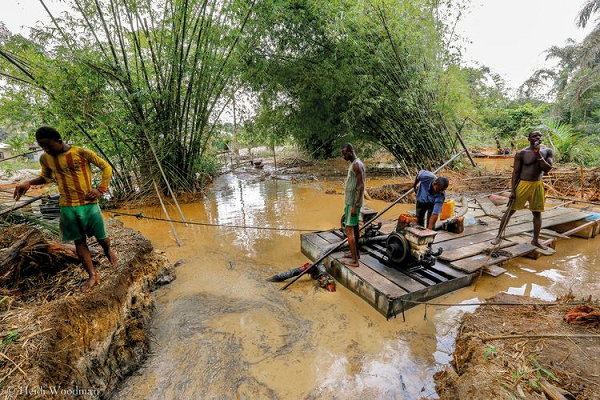The Ghanaian mining sector is facing mounting pressure to implement stricter enforcement mechanisms against illegal mining activities, as foreign investors increasingly raise concerns about the security of their concessions and the broader impact on investor confidence.
Speaking on the issue, Mr. Ahmed Natogmah, the Acting CEO of the Ghana Chamber of Mines, painted a troubling picture of encroachment by illegal miners on concessions legally acquired and explored by licensed mining companies.
“Some companies spend upwards of $20 million and over a decade on exploration activities to delineate viable mineral reserves.
“But once this is done, their concessions are often overrun by illegal miners—many of whom are not even Ghanaians.”
Mr. Ahmed Natogmah, the Acting CEO of the Ghana Chamber of Mines
According to Natogmah, the situation is particularly dire for foreign mining investors, who see their long-term investments endangered by poor enforcement and a lack of institutional protection.
He cited instances where illegal miners had taken over entire sites, leaving legitimate concession holders powerless.
“You have an influx of people, and some of them are foreigners.
“They take over the concession, and it’s almost as if the licensed company is waiting for them to leave—but they never do.”
Mr. Ahmed Natogmah, the Acting CEO of the Ghana Chamber of Mines

The Chamber of Mines said its members are increasingly concerned about the safety and future of their operations.
In particular, AngloGold Ashanti’s Obuasi Mine, one of Ghana’s largest gold producers, has reported repeated incursions onto its legally secured concession. These breaches pose not just security threats but also financial and reputational risks.
Mr. Natogmah asked, “What signal does that give to investors when the arrest of one illegal miner sparks an entire community protest?” pointing to the complex relationship between mining firms and host communities.
The lack of consistent law enforcement, he argued, emboldens illegal mining groups and leaves companies vulnerable to both physical and legal confrontation.
In many cases, arrests are met with mass resistance, making policing nearly impossible without sparking unrest.
Call for Stronger Policies

Natogmah acknowledged that some communities wish to engage in small-scale mining, but stressed the need for a structured and legal approach.
“Companies cannot simply hand over portions of their concession—it’s against the law.
“If land is to be reallocated, it must be returned to the Minerals Commission, which will then allocate it appropriately.”
Mr. Ahmed Natogmah, the Acting CEO of the Ghana Chamber of Mines
To balance investor security with community interests, some companies have ceded portions of their concessions to the government for regulated community mining projects. However, Natogmah warned that this practice could set a dangerous precedent.
“Once you cede a small portion, 100 people come. Then 1,000 follow. How long can you keep giving?
“Eventually, everything will be gone. And what about your investment?”
Mr. Ahmed Natogmah, the Acting CEO of the Ghana Chamber of Mines
The Chamber of Mines is now urging the government to clarify policies around mining land allocation and ensure stronger enforcement of existing laws.

According to Mr. Natogmah, the current policy ambiguity is leaving companies to bear the political and financial costs of issues that should be resolved through government intervention.
“We are also vulnerable. Companies are paying a political price for something that should be resolved by clear policies and law enforcement.”
Mr. Ahmed Natogmah, the Acting CEO of the Ghana Chamber of Mines
While Ghana remains one of Africa’s top gold producers and a key investment destination, experts warn that failure to address the challenges of illegal mining could jeopardize its position as a trusted and secure mining jurisdiction.
The current crisis reflects broader tensions within Ghana’s mining ecosystem, where the state must balance the economic benefits of foreign investment with local community demands for inclusion and equity.
As illegal mining continues to flourish, the lack of a unified national response threatens the stability and sustainability of the entire sector.
For now, the Chamber of Mines insists that what is needed most is political will, policy clarity, and uncompromising enforcement.
READ ALSO: Politicians Warned to Back Off CJ’s Removal Process







